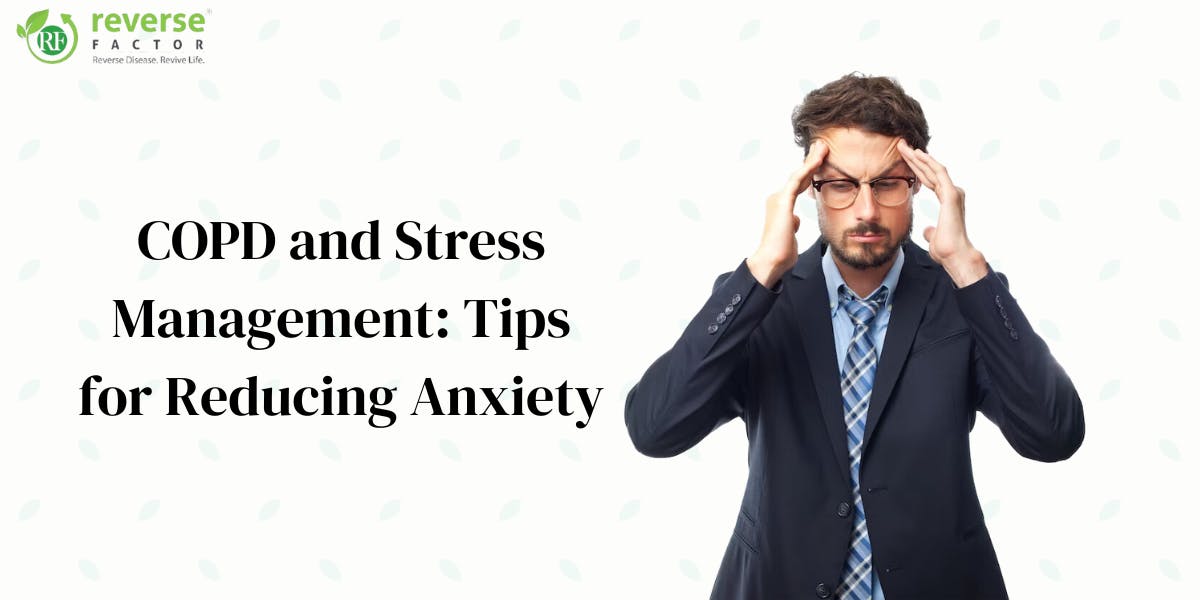Anyone who has chronic stress might feel uneasy, but those who have COPD may experience the harmful effects to a greater degree. Chronic anxiety can worsen symptoms and harm an individual’s general health and wellness. Chronic stress can result in sadness, irritability, and a compromised immune system. It is especially worrisome for people who already have a chronic illness like COPD. To improve physical and mental health, people with COPD must prioritize stress management. Mind-Body Medicine program is an effective stress-reducing technique. It can provide you with a sense of peace and control even while facing the challenges of living with COPD.

In this blog, we'll explore the relationship between COPD and stress management. We will also offer helpful ideas for reducing anxiety and helping you live a healthy life. So, continue reading to learn and gain some valuable knowledge about stress management.
Recommended: Understanding The Gut-Brain Connection - Reverse Factor
How COPD Can Trigger Stress And Anxiety?
Stress and anxiety are common side effects of COPD. People with COPD frequently have breathing problems, which can be a frightening experience. Moreover, the physical limits brought on by COPD can cause dissatisfaction, sadness, and isolation. These feelings can contribute to stress and anxiety. Stress levels may also increase for those who have fear about their future and their capacity to manage the condition. Therefore, you need to identify your stress triggers to control and manage the condition.
Stress can negatively impact our overall health including our heart and liver. Stress triggers the body to create hormones that can raise blood pressure and heart rate and eventually cause heart disease. It can also result in liver inflammation, which promotes fat storage and the development of fatty liver disease. This is why health programs like fatty liver disease reversal and heart disease reversal program focus on reducing stress.

Must Read: How to Manage COPD: Lifestyle Changes and More
Most Effective Stress And Depression Management Tips
Even if you don’t have COPD, stress can still impact your health and life. It can affect your mental as well as gut health. Healing gut health with stress management services like joining yoga classes can help you a lot. Let’s check out some effective tips to manage your stress.

Learn Breathing exercises and techniques
Stress management helps to improve your quality of life by reducing your breathing difficulties. You can start practicing breathing exercises to reduce your stress levels and improve your lung function. By learning how to control your breathing you can improve the oxygen flow to your body. You can control shortness of breath and reduce the negative effects of stress on your body by practicing pursed-lip breathing. To practice pursed lip breathing, you need to relax your neck and shoulders. Then simply breathe in through your nose for two seconds, then exhale through your pursed lips for four seconds. This technique helps to slow down your breathing and promote relaxation. Practicing this exercise regularly can help increase your lung capacity and endurance.
Try Relaxation techniques
People who have COPD may find that relaxation techniques are a very powerful tool for controlling stress. However, relaxation techniques can promote a sense of peace and relax your mind and body. It can improve your sleep issues and also improve your overall mood. One way to practice relaxation techniques is to find a quiet, comfortable place to sit or lie down. Then, close your eyes and concentrate on your breathing pattern, focusing on the sensations of each breath. Regular practice will help you become more focused, which will reduce the damaging effects of stress on your body and mind.
Get Proper Sleep
One of the best methods to reduce stress in your life is to get enough sleep. Your body can restore itself when you get enough sleep, which leaves you feeling refreshed and prepared to begin the new day. On the other side, a lack of sleep can produce more stress hormones, which can make you feel frustrated and anxious. Lack of sleep can also make it difficult for you to think properly and make wise decisions, which will only increase your stress levels. Make sure you get 7-9 hours of sleep every night to improve your overall health including COPD.
Quit Smoking
One of the best things you can do for your health and well-being is to stop smoking. Smoking can be a major source of stress in your life and it also increases your risk for several health problems, including COPD. Smoking can lead to stress because it contains nicotine which is a potent stimulant that can produce emotions of anxiety and tension. By giving up smoking, you can lower your risk of developing COPD. You might even notice improvements in your overall health and lung function.
Consume Nutritious Plant-Based Diet
Fruits, vegetables, whole grains, legumes, nuts, and seeds are all rich sources of vitamins, and minerals. All these nutrients help your body to function normally and combat stress. Along with offering a variety of health benefits, these foods also have fewer calories and more fiber. It makes them a fantastic option for maintaining a healthy weight. Plant-based diets can lower the risk of chronic illnesses like diabetes, heart disease, and even some types of cancer. Why not try it and see how much better you feel as a result?
Build A Support System
Building a support network can help you manage your disease and reduce the stress that comes along with COPD. A support group offers the chance to interact with people who are going through similar experiences. It can be a tremendous source of emotional support. Sharing your struggles with those who understand what you’re going through might help you feel less alone.
Final Thoughts-
Living with COPD can be difficult and at times overwhelming. You can improve your quality of life and find more peace of mind by taking efforts to control your stress and anxiety. There are various strategies to reduce the effects of stress on your life and manage the symptoms of COPD. Stress management can help you to overcome the challenges you are facing with COPD. You can better manage your COPD and have a full life by taking care of your emotional and mental well-being. So, take a deep breath, seek out assistance, and trust that you have the strength and resilience to handle any difficulties that may arise.
Frequently Asked Questions-
How does COPD affect stress levels?
COPD is a chronic lung disease that can impact stress levels by causing anxiety and fear.
Can COPD get worse under stress?
Yes, stress can trigger COPD symptoms and exacerbate the condition.
What are some typical signs of stress associated with COPD?
Anxiety, depression, irritability, and sleeping issues are typical signs of stress caused by COPD.
What are some proven stress-managing techniques for COPD sufferers?
Breathing exercises, meditation, and yoga are all helpful stress-reduction strategies for COPD patients.
How does exercise reduce the stress associated with COPD?
Deep breathing exercises can improve lung function and reduce stress and anxiety.
What foods can help COPD patients manage their stress?
You must start consuming plenty of fresh fruits and vegetables that contain healthy nutrients. Research has shown that consuming plant-based foods can help reduce stress and anxiety.
Is it possible to live a fulfilling life with COPD despite the stress and challenges?
Yes, you can manage your condition and also live a quality life with some lifestyle changes and stress management techniques.
What are some common triggers of stress for people with COPD?
Common stressors for COPD sufferers include anxiety about the future, financial worries, and social isolation. These stressors may trigger COPD symptoms by causing depression and anxiety.




